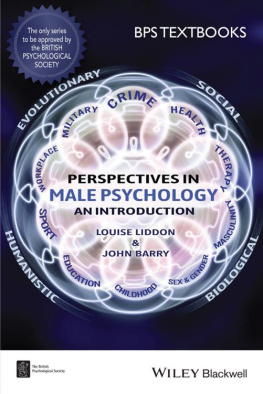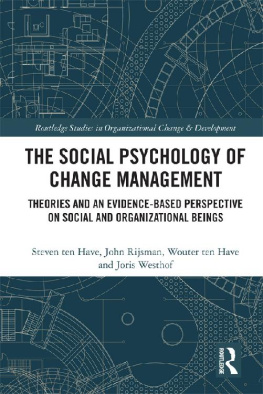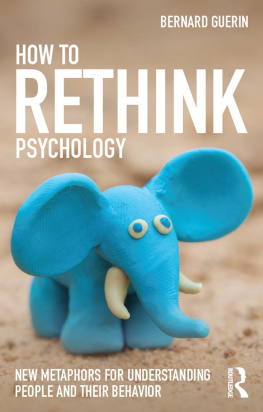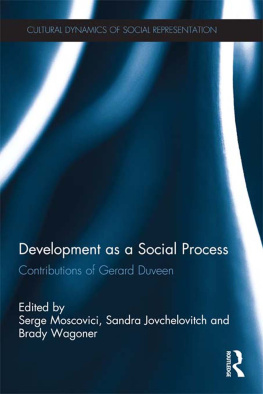Understanding the Self and Others
Explorations in intersubjectivity and interobjectivity
Edited by Gordon Sammut, Paul Daanen and Fathali M. Moghaddam
First published 2013
by Routledge
2 Park Square, Milton Park, Abingdon, Oxon OX14 4RN
Simultaneously published in the USA and Canada
by Routledge
711 Third Avenue, New York, NY 10017
Routledge is an imprint of the Taylor & Francis Group, an informa business
2013 selection and editorial material, Gordon Sammut, Paul Daanen and Fathali M. Moghaddam; individual chapters, the contributors
The right of Gordon Sammut, Paul Daanen and Fathali M. Moghaddam to be identified as the authors of the editorial material, and of the authors for their individual chapters, has been asserted in accordance with sections 77 and 78 of the Copyright, Designs and Patents Act 1988.
All rights reserved. No part of this book may be reprinted or reproduced or utilised in any form or by any electronic, mechanical, or other means, now known or hereafter invented, including photocopying and recording, or in any information storage or retrieval system, without permission in writing from the publishers.
Trademark notice: Product or corporate names may be trademarks or registered trademarks, and are used only for identification and explanation without intent to infringe.
British Library Cataloguing in Publication Data
A catalogue record for this book is available from the British Library
Library of Congress Cataloging in Publication Data
Understanding the self and others: explorations in intersubjectivity and
interobjectivity/edited by Gordon Sammut, Paul Daanen, Fathali M. Moghaddam.
p. cm.
Includes bibliographical references and index.
1. Social interaction. 2. National characteristics. 3. Social groups.
I. Sammut, Gordon. II. Daanen, Paul. III. Moghaddam, Fathali M.
HM1111.U535 2013
302dc23
2012037800
ISBN: 978-0-415-68886-4 (hbk)
ISBN: 978-0-203-33141-5 (ebk)
Typeset in Times New Roman
by Wearset Ltd, Boldon, Tyne and Wear
Contents
| GORDON SMAMMUT, PAUL DAANEN AND FATHALI M. MOGHADDAM |
| ROM HARR AND GORDON SAMMUT |
| JOHN SHOTTER |
| GIUSEPPHINA MARSICO, KENNETH R. CABELL, JAAN VALSINER AND NIKTA A. KHARLAMOV |
| ALAN COSTALL |
| RACHEL BARR |
| JAMES T. LAMIELL |
| DEREK HOOK |
| PAUL DAANEN AND SABRINA YOUNG |
| DONALD M. TAYLOR, RGINE DEBROSSE, MEGAN COOPER, AND FRANK KACHANOFF |
| GORDON SAMMUT, STAVROULA TSIROGIANNI AND FATHALI M. MOGHADDAM |
| ROBERT SCHMIDLE |
| MARTIN W. BAUER |
| GORDON SAMMUT, PAUL DAANEN AND FATHALI M. MOGHADDAM |
Understanding self and others
Explorations in intersubjectivity and interobjectivity
Gordon Sammut, Paul Daanen and Fathali M. Moghaddam
How do we human beings come to understand ourselves and others around us? This question could not be more timely or pertinent to the issues facing humankind today. At the heart of many of our world's most troubling political and social problems lies a divergence, and sometimes a sharp contradiction, in perspectives between nations and/or cultural groups. For example, how should we characterise the seemingly intractable divide between the governments of India and Pakistan, America and Iran, among many others? What lies at the heart of the continuing rifts between Israelis and Palestinians? How has the political divide in the United States taken on such polemic divisions? How are we to make sense of the baffling resistance certain groups of people in many nations have to the overwhelming evidence of the human causes of global climate change?
In essence, the divergences in all of these perspectives are related to fundamentally different ways in which groups perceive and value their existence and construct a meaningful picture of who they are in relation to others. Thus, potential solutions to these seemingly intractable divides must come to understand what both facilitates and hinders a meaningful exchange of fundamental ideas and beliefs between different cultural groups. By drawing on multidisciplinary approaches to social psychological phenomena illustrated in these examples, this book draws together a number of cutting edge researchers and practitioners in psychology and related fields. The discussions in this book both review some of the most significant debates concerning how different groups come to share meanings and radically advance this discussion in impactful new directions. While the chapters for the most part explore present and future knowledge, attention is also given to the historical roots of twenty-first century research.
Theoretical antecedents
Many of the current presuppositions concerning human psychology may be retraced to Cartesian philosophy. Descartes was the most influential modern thinker to conceptualise cognition in terms of a consciously reflexive thinking mind, or what he famously called the cogito. His influence on the scientific human psychology that evolved from the mid-nineteenth century is unparalleled. Particularly germane to social psychology and the practical issues mentioned above, two problems resulting from the Cartesian paradigm have been enormously problematic. The first issue has come to be known historically within Philosophy as the problem of other minds; a puzzle that points to the difficulty in accounting for how two individual and independent minds are capable of understanding one another's thoughts and intentions. Intimately associated with the first, the second issue that the Cartesian paradigm provokes is the problem of a knowable and objective reality existing externally to the cogito, given that whatever human beings experience with regards to this reality is fundamentally a product of neurological functioning occurring within the brain (Harr and Moghaddam, 2012). Specifically, this problem points towards the difficulty in accounting for how human beings acquire their understandings of the world around them if such understandings are founded in and upon their own idiosyncratic points-of-view (i.e., upon one's own personal and subjective conscious reflections upon the world).
Both of these problems thus lead towards a basic question: how do humans share a social reality given inter-personal differences in individual perceptions and experiences? By addressing this basic question, we aim in this volume to gain a better understanding of how inter-cultural differences in meaning are so difficult to reconcile.
Such reflections on the philosophical dominance of the Cartesian paradigm on the discipline of psychology lead to an interesting conundrum. In spite of the purported yet taken for granted fact that one's knowledge of the world begins with one's subjective experiencing of the world, both common sense evidence and social theory point towards the ability of individuals to successfully navigate their social world with mutual reference to themselves and others. In other words, whilst individuals can and do hold their own, to some degree, idiosyncratic points of view as legitimate, rightful and accurate versions of reality, in the course of social interaction individuals communicate their views to others and in so doing open themselves up to the possibility of adjusting or changing their views to ft aspects of reality that lie outside their grasp. Asch (1952) famously called this cognitive process












